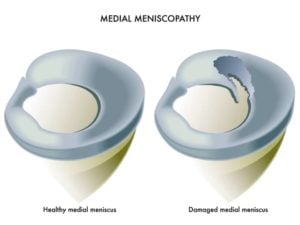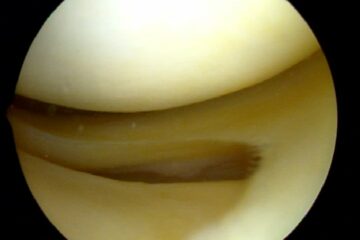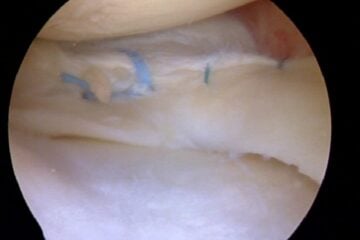

Derrick Rose is out again. This time he has torn a meniscus in his knee. The meniscus is the primary shock absorber in our knee. The meniscus plays a critical role in maintaining the well being of our knees. We actually have two menisci within each knee. A medial, or inner meniscus; and a lateral or outer meniscus. The most common area for a meniscus tear to occur is in the inner, back side of the knee — or the posterior horn of the medial meniscus.
What is the cause of a meniscus tear?
Once again our sports medicine experts from around the country are assisting in educating you about one of the most common causes of knee pain — a meniscus tear. This post we will focus on the cause of meniscus tears. In later posts, we will discuss if treatment is needed for all tears and what those treatment options are.
Meniscus tears can be acute, or due to an injury — or a meniscus tear can be degenerative, where your cartilage is simply wearing out from a lifetime of activity. The cause of the tear matters, because that helps us determine what treatments to offer you.
Let’s read what our experts have to say.
Dr David Geier: Twitter: @DrDavidGeier ; Website
Most common cause of meniscus tears.
• acute
• degenerativeI see acute meniscus tears in teenagers and young adult athletic individuals who have some sort of twisting injury. Soccer, tennis, golf, twisting the knee in an exercise program and those types of activities.
I see degenerative tears in active people with early wear-and-tear of their knees that developed specific onset of very localized pain in a specific spot in their knees. Often the new pain develops after a seemingly insignificant event or no injury at all.
Dr Derek Ochiai: Twitter: @DrDerekOchiai ; Website
The most common causes acute of meniscal tears: Meniscal tears are commonly from acute twisting injuries, where the knee buckles and gives out. Because the buckling event can sometimes be associated with a major knee ligament injury, many times patients with an anterior cruciate ligament (ACL) or posterior cruciate ligament (PCL) injury can also have meniscal tears. The meniscus helps the knee “stay in place”, and acts as a secondary restraint to abnormal knee motion.
Most common causes of degenerative meniscal tears: Arthritis is a condition where the knee articular (gliding) cartilage starts to degenerate. As this cartilage degenerates, more stress and pressure is put on the meniscus. At the same time, the meniscal cartilage is also starting to get less stretchy and more susceptible to cracks and tears. This combination leads to degenerative meniscal tears.
Dr Jeff Berg: Twitter: @DrJeffBerg ; Website
Meniscal tears tend to occur from two primary causes. One is an acute traumatic injury and the other is due to a degenerative process, the accumulation of damage and wear, slowly over time. As a result, tears that occur following a distinct noticeable traumatic event typically occur in younger people, whereas degenerative tears tend to occur in older people. In reality, many acute tears likely occur from some combination of both of these factors: Menisci with lesser degrees of degeneration (not enough to cause a tear by itself) undergo lesser trauma (also not enough to cause a tear by itself) resulting in a mixed type of tear.
Dr Scott Slattery: Twitter: @sportscaduceus ; Website:
The meniscus is a C shaped piece of cartilage in the knee between the two bones that make up your knee joint. Although it has many functions, it can be thought of as a shock absorber and cushion along the edge of the joint. Injury to the meniscus and loss of meniscal tissue with subsequent loss of normal function, can predispose patients to early degenerative arthritis. Meniscus tears are fairly easily diagnosed with a history and physical exam by an experienced examiner, but MRI is commonly used to confirm the diagnosis. The most common cause of meniscus tears is age related degeneration. As we age, the connections between the collagen fibers that make up the meniscus begin to deteriorate, causing failure of the structure and tears due to stresses in the joint. Often these tears can occur with minimal load and trauma. Of course, a weakened meniscus can tear more easily when significant trauma occurs. Acute tears can occur even in young patients with a normal meniscus if the load is significant. Usually this occurs during sports that involve pivoting and twisting.
Meniscus tears are very common. The older we get the more likely that your tear will be degenerative in nature. The younger you are, the more likely that your tear is acute or due to an injury. As we will explore in our next series of posts, the cause of your meniscus tear will have a significant impact on the treatment we recommend.
Stay tuned …














Hey there. I recently injured my knee running. I went to an orthopedic urgent care, where they did an x-ray of my knee. During the x-ray they did not find anything unusual, so they sent me to physical therapy. The physical therapist thinks that, based on the issues I am experiencing, I have torn my meniscus. They have not bothered to do an MRI to determine if that is actually what happened yet, as they think physical therapy will fix it. I am on crutches, wearing a compression sleeve, and going to PT twice a week. This week is week 2 and I am feeling no improvement. I actually feel worse than before I went to the dr originally. How long should I do PT before I push for the MRI to determine the severity of the injury? I have a toddler at home and I can’t keep up with him, it is hard for me to pick him up and walk to the kitchen, and my work life is suffering as well. Going from sitting to standing is excruciating. I am in more pain now than when I gave birth. Please let me know if you have any advice!
It might be worth seeing an Orthopedic Sports Doc for a good examination. They will then determine if further imaging is needed to see what may be hurting you so much.
Good luck !
I am 43 years old, and my MRI results show a complex tear involving the posterior horn and mid body of my medial meniscus. My orthopedic surgeon recommends arthroscopic surgery, but I am hesitant. The pain is dull when I walk and has lasted 12 weeks now. I had previous pain in my knees, but the recent pain is a result of a gym workout and hiking. I have read that physical therapy is as effective as surgery. I am impatient for my knee to heal, but I want to avoid surgery if at all possible. What are your thoughts?
I can only reiterate what the research demonstrates…. and you seem to know what that is :-)